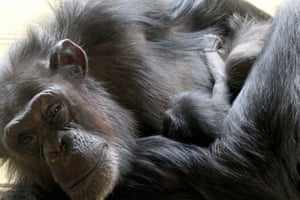It’s easy enough for Darren McGarry to socially distance from other people as his home is based in Edinburgh zoo. McGarry, who has worked for the zoo for 34 years, can go an entire day without seeing someone since a UK-wide lockdown forced non-essential businesses to close.
Though zoos across the country are unusually quiet, zookeepers are faced with the challenge of ensuring life goes on as normal for the animals they care for amid a pandemic that has profoundly altered British society.
At Marwell zoo, based in Winchester, some staff have moved into empty cottages on site to continue caring for the animals. Ian Goodwin, the animal collection manager, said: “If they are people who live together in a house out of the zoo, we’ve brought some of them into the cottages that are empty.”

He said staff who lived on site or those who came in were rigorously following social distancing guidelines. “They have their tea and dinner breaks at different times and they go home at different times. The animals are still getting their care they need throughout the day, we’re just limited to how many keepers we have on site or at the same time.”
At Twycross zoo in Leicestershire, staff have moved to live on site, while London zoo has repurposed its visitor lodges into temporary accommodation for essential staff. Keepers in London have also been giving extra attention to the pygmy goats, who have been “waiting patiently for visitors who never turn up”.
Derek Grove, the director at Dudley zoo, said keepers who could not live on site had gone to great lengths to ensure there were not any significant changes to the animals’ routines. “We’ve got orangutans and chimpanzees and they do get used to people and the way you work around them, the routine that you have. As soon as you start changing things, animals aren’t particularly pleased about it.”

Others have been keen to minimise the impact they can have on other people and animals. At London zoo, staff have been car sharing and cycling to work to reduce movement across the city, while zookeepers who work closely with animals are wearing face masks and gloves when preparing their food or entering enclosures.
But zookeepers are limited by the fact they are not classed as key workers, according to Gary Batters, the director of Banham zoo in Norfolk and African Alive in Suffolk.
“Unlike a factory and many other businesses that shut down and walk away, we do need to have a team of people working continuously to make sure our animals are well cared for,” Batters said. “We have issues with childcare where that makes it quite difficult for our teams to come in because they have other obligations at home.”
Zoos across the country warn they face a financial crisis as a result of being forced to shut to the public, with many launching fundraising campaigns to help them continue caring for the animals.
McGarry said zoos faced a similar crisis 20 years ago when the foot-and-mouth disease outbreak forced them to shut for nearly two months, but he believes the coronavirus could have a more significant impact. “This is so different because there’s always a chance that staff could start to go off sick with the virus,” he said.

While the “eerie” silence during the day has been peaceful, McGarry is looking forward to opening the zoo to the public again. “The chimpanzees start to wonder why there’s nobody wandering around and they go to the window to look for people.”